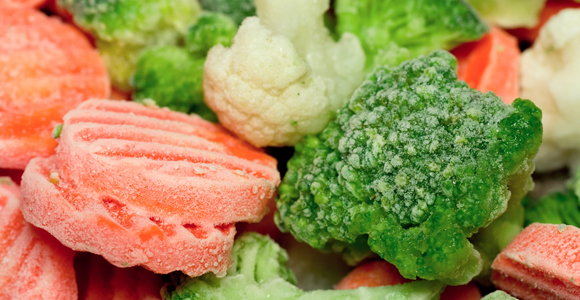As a dietitian, I'm often asked this question and the answer isn't as simple as you might think. There are several things to consider when trying to decide which form you want to purchase. You'll likely think about cost, color, taste and texture preferences, nutritional value, shelf-life and storage, and the amount of time and level of difficulty involved in preparation. When being asked this question, however, most often people are specifically wondering about the nutrient content of the different forms.
Common Misconceptions
It's a common misconception that fresh fruits and vegetables are the "healthiest," with most people associating them with having the most beneficial nutrients, such as vitamins and disease-fighting phytochemicals. However, this is simply untrue if you take storage into account. The amount of nutrient-loss that occurs in fresh produce is higher than once thought. A review of the research revealed that storage and cooking techniques could cause up to half of the nutrients to be lost from fresh fruits and vegetables.
New Research Has Surprising Results
A new study out of the University of Georgia confirms that fresh isn't always best regarding vitamin and mineral content. The study investigated the amount of vitamins and minerals in these eight fruits and vegetables: cauliflower, broccoli, green beans, green peas, spinach, corn, blueberries and strawberries. Researchers compared the nutrient content of the produce on the date it was purchased, five days after refrigeration, and after being frozen. Analysis revealed that some of the frozen produce actually had higher amounts of vitamin C, vitamin A and folate than their fresh stored counterparts. Previous studies have found similar results.
So why do frozen and canned fruits and vegetables often contain more beneficial vitamins? Freezing and canning foods locks in many key nutrients that are often lost when fresh produce is allowed to sit for several days after being harvested. When vegetables are blanched before being frozen, it prevents enzymatic breakdown of nutrients. Fruits, which aren't blanched before being frozen, have slower enzymatic and microbial breakdown and loss of nutrients when frozen.
Why Do People Think Canned & Frozen Produce is Worse?
Canned fruits and vegetables do lose a small amount of nutrients as they're cooked prior to canning, but there isn't a loss of nutrients after being sealed in the can because oxygen isn't available to break them down. Frozen fruits and vegetables don't lose many nutrients in the beginning stage when they're blanched but could lose a small amount of nutrients due to oxidation after they're frozen for a long period of time. However, since most people aren't eating produce immediately after it's picked from the field (when it has the most vitamins and phytochemicals), by the time it reaches their plates it's already lost more nutrients than those small amounts lost during the canning or freezing processes. Fiber and minerals seem to be about the same for fresh, frozen and canned produce.
Other benefits of canned and frozen fruits and vegetables include a lower cost, especially for out-of-season items, a long shelf-life (up to six months for frozen and two to four years for canned), easy preparation and availability all year-round. With vegetables, try to cook them in as little water as possible to prevent further loss of water-soluble vitamins (steaming preserves most of the vitamins).
Getting the Most Nutrients
One way to enjoy the most benefit from fruits and vegetables in all forms is to purchase locally from a trusted farmer or grow your own produce. Eating fruits or vegetables on the same day that you bought from a local farmer or picked them out of your own garden will allow you to get more vitamins and other beneficial nutrients while also helping the environment, your local economy and possibly your wallet. You can also do your own canning and freezing to help seal in those nutrients from produce you picked up that day.
The bottom line: Don't worry so much about which form of produce is the best and focus more on trying to get more fruits and vegetables overall in your diet. Relying on a combination of fresh, frozen and canned fruits and vegetables can help ensure you're meeting the recommended number of servings each day. 
Kari Hartel, RD, LD is a Registered, Licensed Dietitian and freelance writer based out of St. Louis, MO. Kari is passionate about nutrition education and the prevention of chronic disease through a healthy diet and active lifestyle. Kari holds a Bachelor of Science in Dietetics from Southeast Missouri State University and is committed to helping people lead healthy lives. She completed a yearlong dietetic internship at OSF St. Francis Medical Center in Peoria, IL, where she worked with a multitude of clients and patients with complicated diagnoses. She planned, marketed, and implemented nutrition education programs and cooking demonstrations for the general public as well as for special populations, including patients with cancer, heart disease, diabetes, Alzheimer's disease, obesity, and school-aged children. Contact Kari at [email protected].



